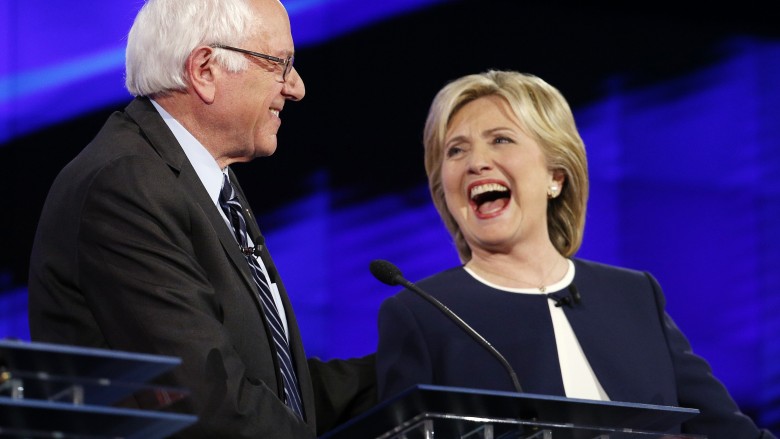Saturday night Democratic debate may flop
By Evan Lips | November 13, 2015, 18:46 EST
 Sen. Bernie Sanders, of Vermont,, left, and Hillary Clinton share a laugh during the CNN Democratic presidential debate Oct. 13 in Las Vegas. (AP Photo/John Locher)
Sen. Bernie Sanders, of Vermont,, left, and Hillary Clinton share a laugh during the CNN Democratic presidential debate Oct. 13 in Las Vegas. (AP Photo/John Locher) DES MOINES, IOWA – As the focus shifts to Saturday night’s Democratic National Committee presidential debate at Drake University, pundits and political wonks are wondering if they’ll be the only ones tuning in.
“It’s just gonna be you, and me, and the pundits, and a few other people watching,” said Bob Shrum, a veteran Democratic political consultant who worked on the presidential campaigns of Al Gore and John Kerry, in an interview with the National Review.
The debate, to be hosted by CBS and slated to kickoff at 9 p.m. Eastern time, will be competing for eyeballs with another kickoff likely more significant to the vast majority of Iowans – the tilt between the undefeated University of Iowa Hawkeyes football team, currently ranked no. 8 in the country, and the University of Minnesota Golden Gophers. The game is scheduled to begin at exactly the same time.
In an August interview with WHO-TV, NBC’s Des Moines affiliate, state Democratic Party Chairwoman Andy McGuire said, “the best thing about Iowa is we give everyone a fair shot.”
McGuire added that “there is some input from us,” referring to how much influence state party leaders have on debates hosted in their home states. “Just about locations and timing and that sort of thing,” McGuire clarified.
Yet Kristin Sosanie, the Iowa spokeswoman for former Maryland Gov. Martin O’Malley, who will be on the stage Saturday night, told National Review that the Democratic National Committee “never consulted” McGuire on the timing and scheduling of the lone Iowa debate.
In another recent development, assertions by Florida Rep. Deborah Wasserman Schultz, the DNC leader, that she consulted with former DNC chairmen regarding debate scheduling is now being disputed by the former chairmen themselves. A Time magazine report says that former chairmen Howard Dean, Ed Rendell and Don Fowler have all dismissed Wasserman Schultz’s claim.
The popular belief among Republicans and Democrats alike is that the DNC, and especially Wasserman Schultz, are limiting the number and lessening the impact of DNC debates in order to clear a direct path to the nomination for Hillary Clinton, the former first lady, New York senator and Secretary of State.
A Washington Post report that surfaced in September quoted unnamed DNC insiders who said Clinton’s campaign team had lobbied party officials to limit the number of debates to four.
The debate Saturday will be the second of six planned during the campaign. The field of five candidates in the first debate last month in Las Vegas has since narrowed to three. Both Jim Webb, a former senator from Virginia, and former Rhode Island Gov. Lincoln Chafee have bowed out, leaving Clinton, O’Malley and U.S. Sen. Bernie Sanders, the self-described Democratic Socialist from Vermont, to compete for the nomination.
Of the six DNC-sponsored debates, three are scheduled for weekend days, including Saturday’s. The third debate is set for Dec. 19, a Saturday that falls between the end of Hanukkah and Christmas. The fourth debate falls on Jan. 17, the Sunday night of Martin Luther King Day weekend.
Since 2000, there have been approximately 100 presidential debates, only seven of which have been held on a Saturday. According to the American Presidency Project, an organization that tracks debate data, Thursdays have been the most popular debate day since 2000, with 27 such events.
The Vox website recently analyzed presidential debate data and determined that Thursday “is king” when it comes to attracting an audience. According to Vox, three general-election debates held on Thursdays averaged 66.5 million viewers, “by far the biggest number.”
A piece that appeared on the liberal DailyKos website in September also took Wasserman Schultz and the DNC to task over scheduling. The op-ed did not criticize party leaders for the low number of debates but instead skewered them for their timing.
“I could attend a holiday party with my friends and loved ones, do some last-minute shopping, or watch a presidential debate,” mused contributing editor Laura Clawson. “Why not just schedule it on Christmas Eve?”
Simon Rosenberg, founder of the New Democratic Network and a candidate for DNC chairman in 2005, has also ripped the party over timing. In a piece published on the MSNBC website, Rosenberg described the scheduling as “a mess” and pointed to a dearth of debates set to occur close to when “consequential voting” actually begins.
“As of today, the Republicans have 10 debates scheduled before mid-March, while the Democrats have four,” Rosenberg wrote in his Sept. 9 piece. “Of those debates, the GOP has six debates scheduled in the 10 weeks closest to the actual voting, while the Democrats have just one.”
Reach Evan Lips by emailing him at [email protected] or follow Evan on Twitter @evanmlips. (https://twitter.com/evanmlips)











